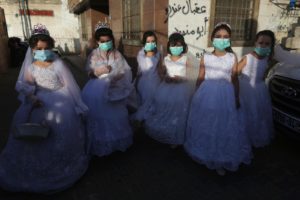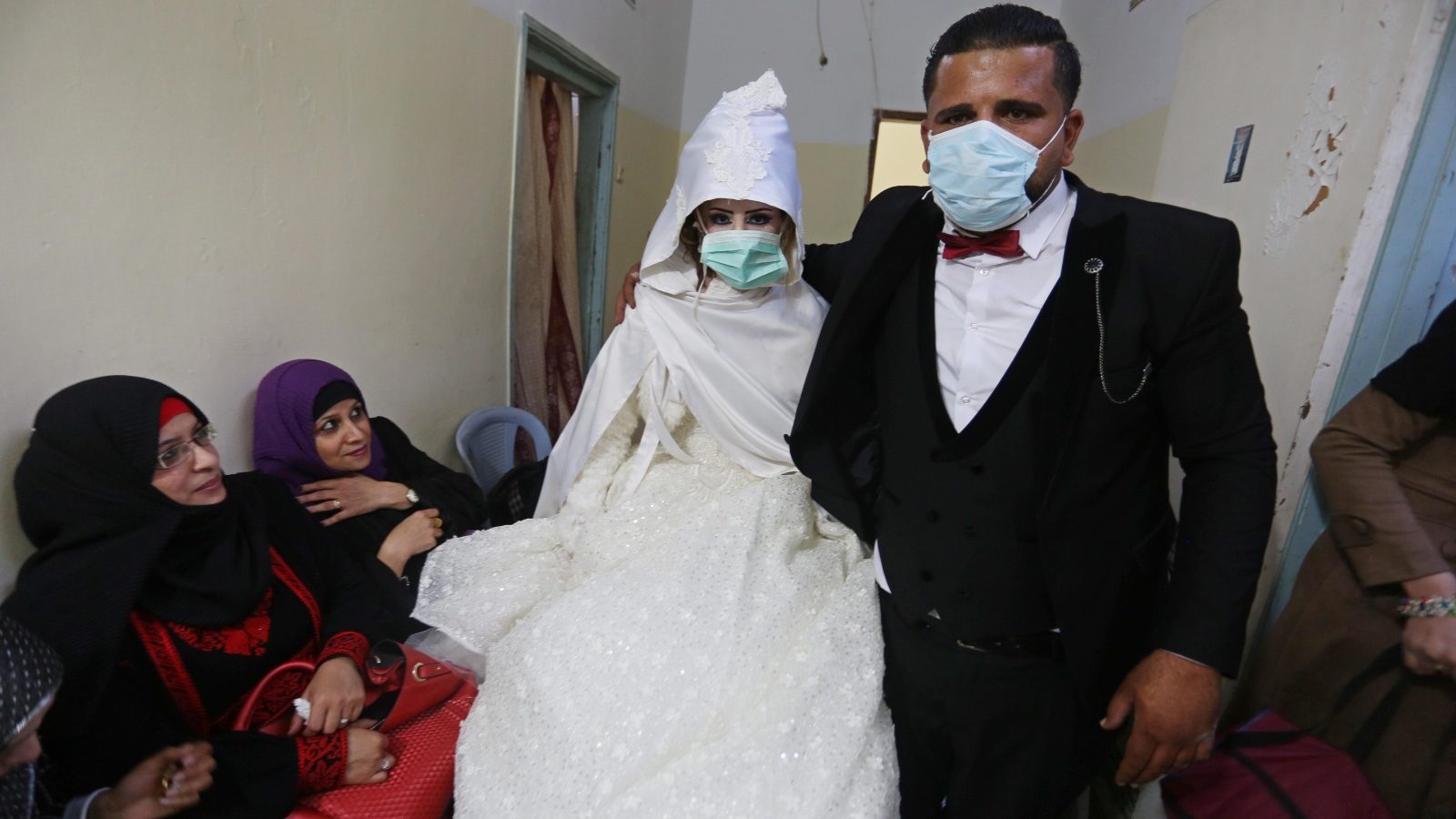Pandemic Helps Gaza’s Youth Tie the Knot
21% rise in marriages as the coronavirus crisis drives costs down, official says
[Gaza City] In addition to dealing crushing blows to the health, finances and social lives of the more than 2 million Palestinians living in the Gaza Strip, the COVID-19 pandemic has, bizarrely, proved a blessing for many young couples in the tiny coastal enclave.
Gaza’s Islamic courts registered 20,919 marriage contracts in 2020, compared with 17,270 the previous year, an increase of 21%, Sheikh Hassan al-Jojo, the head of Gaza’s Supreme Sharia Judicial Council, told reporters last week.
Jojo attributed the spike to the drop in the costs of a wedding due to the COVID-19 outbreak, with young people able to marry with fewer expenses.
Because there are multiple ceremonies and rituals involved, a wedding in Gaza costs an average of about $7,000, or far more than the average yearly salary for most Gazans.
Ahmad Abu Eisha, a Gazan father who decided to hold the wedding of his 29-year-old son in the midst of the pandemic, told The Media Line: “We all know that the costs of marriage in Palestinian society are fairly high. In addition to the Islamic dowry and housing, every young man tries to cover the cost of basic rituals such as the men’s party, the wedding hall, the relatives’ feast and other traditional ceremonies.”
But, he added, “with the coming of the COVID-19 pandemic and with the strict lockdown and safety measures, most of these rituals have been banned. Thus, a young man can save 50%, if not more, of the total cost, which is a relief amid the harsh economic situation and the scarce job opportunities.”

Celebrating with the groom at a wedding in the central Gaza Strip in late 2020. (Hassan Esleih)
Ahmed Idrees, a young temporary employee who wed at very little cost early last month, said the pandemic allowed him to think seriously about marriage.
“Here in Gaza, we live in an endless circle of struggle where there are no jobs, no political horizon and simply no life. Frankly, I never thought about marriage before because I knew with these high costs, I’d be in debt for life. Maybe it’s weird to say it, but thanks to the coronavirus for enabling unfortunate youth like myself to find a partner and make a family,” Idrees told The Media Line.
COVID-19 has managed to cut the price and stress of obligatory wedding rituals, most of which are the result of old-fashioned and burdensome traditions.
Maybe it’s weird to say it, but thanks to the coronavirus for enabling unfortunate youth like myself to find a partner and make a family
Raeda Weshah, a Gaza-based psychiatrist, told The Media Line the reduction in expenses produced by measures against the coronavirus has had positive psychological ramifications for both the couples and their families.
“Marriage, in general, causes acute stress for the parents, because of the expenses and the preparations, and for the couples as well. In the Palestinian case, the groom encounters additional pressures because he knows that after the wedding he will have enormous financial commitments to pay,” Weshah said.
“That’s why,” she added, “when we remove the causes − the heavy expenses, the consecutive ceremonies, and the exhausting social interactions − we significantly reduce stress and anxiety.”
Even after the pandemic ends, something in people’s mindsets will have changed, the psychiatrist said.
“We know that changing culture takes a long time, but with the huge effects of the COVID-19 pandemic people have begun to think differently and to let go of worn-out norms. In experiencing the positive results – healthier minds, bodies and relations, and lower costs – people are now moving to a new perspective and culture,” Weshah added.

Preparing to escort the bride at a wedding in the central Gaza Strip in late 2020. (Hassan Esleih)
This is likely to increase the rate of marriage going forward. However, this increase in social gatherings also raises health concerns.
Dr. Mohammad Abu Rayya, an epidemiologist and health consultant, told The Media Line that the danger of the coronavirus remains high in Gaza.
“At a certain point at the beginning of the outbreak, weddings, funerals and all kinds of gatherings caused serious fears for our health system, but today I think we have reached a point of [satisfying] public awareness, thanks to the efforts of the health ministry and its supporting bodies that work hard to regulate safety measures and to control the epidemiological situation,” he said.
“However,” he added, “we’re still at the critical stage and the danger hasn’t passed yet, because the Gaza Strip is a densely populated area with fragile capacities.”
Abu Rayya recommended that, when attending gatherings, people should strictly follow anti-virus measures and rules.
“Committing to health protocols and keeping social distancing are necessities in this time and, most important, we must learn to say no to non-family wedding invitations. It’s a matter of health,” Abu Rayya said.


